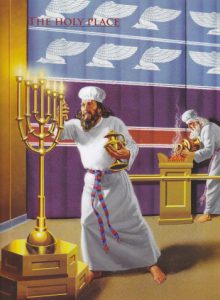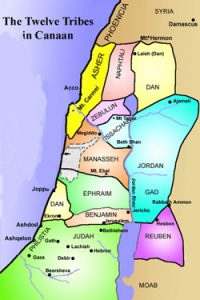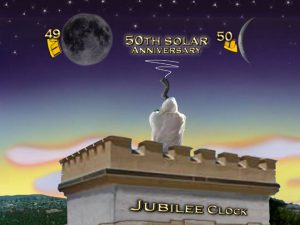Chag Sameyach! Welcome to the 2017 Shavuot Special. Explore the deep and meaningful connections with this second of three great feasts as we go from the earliest roots in Genesis literally all the way to Revelation, with many intriguing and unexpected stops in between. From calendar truths to the long reach of prophecy and from debunking long standing traditions of men to lining up the most ancient witnesses, journey with me to see our glorious past link up with our apocalyptic future as we do the Torah together!
Chag Sameyach! Welcome to the 2017 Shavuot Special. Explore the deep and meaningful connections with this second of three great feasts as we go from the earliest roots in Genesis literally all the way to Revelation, with many intriguing and unexpected stops in between. From calendar truths to the long reach of prophecy and from debunking long standing traditions of men to lining up the most ancient witnesses, journey with me to see our glorious past link up with our apocalyptic future as we do the Torah together!
Please Note: If you are having problems printing the notes, go to the image of the notes in the upper right corner and select “pop out”. It will take you to a separate page and you can select the printer icon to print. Thank you!
Go deeper into the mysteries behind the numbers and censuses and also explore some of the most curious and controversial rituals of ancient Israel. Why would Father Yah seemingly command David to take a census and then punish him for doing so? Or, is it possible that the apparently barbaric ritual for testing a wife accused of adultery actually presents a greater risk to the accusing husband? Hear the actual ancient sounds of the Blessing of the Priests and delve into the deep spirituality of the Nazirite vow, bot in Torah times and with the Apostle Paul. And after all that, there is ANOTHER Torah portion still to come, showing the small family rebellion before the Big Rebellion and closing with a brand new revealing Torah Thought for the Week that refutes the lies against Luke’s census once and for all!
Go deeper into the mysteries behind the numbers and censuses and also explore some of the most curious and controversial rituals of ancient Israel. Why would Father Yah seemingly command David to take a census and then punish him for doing so? Or, is it possible that the apparently barbaric ritual for testing a wife accused of adultery actually presents a greater risk to the accusing husband? Hear the actual ancient sounds of the Blessing of the Priests and delve into the deep spirituality of the Nazirite vow, bot in Torah times and with the Apostle Paul. And after all that, there is ANOTHER Torah portion still to come, showing the small family rebellion before the Big Rebellion and closing with a brand new revealing Torah Thought for the Week that refutes the lies against Luke’s census once and for all!
It’s time for censuses in the desert…and if those two things sound boring to you separately,trust me they are anything but when put together. The census is far from a casual matter of facts and statistics; it is literally a matter of life and death, prosperity or disaster because, as David will himself find out later, counting in a way that Father Yah forbids is an extremely dangerous proposition. It’s also about money, property and when to upend the normal rules of inheritance as we begin to inch towards the greatest threat to Moshe’s life that the Torah ever gives us, because when the books are “cooked”, rebellion follows! See the connections for yourself.Please also note, like last week, I expanded the Study Notes to better clarify some of the intricacies of this parsha, so please check them out on pages 1-3 and, as always, if it sounds like my notes in that section say one thing and I say something a bit different, go with the Study Notes version! Todah (thank you)!
It’s time for censuses in the desert…and if those two things sound boring to you separately,trust me they are anything but when put together. The census is far from a casual matter of facts and statistics; it is literally a matter of life and death, prosperity or disaster because, as David will himself find out later, counting in a way that Father Yah forbids is an extremely dangerous proposition. It’s also about money, property and when to upend the normal rules of inheritance as we begin to inch towards the greatest threat to Moshe’s life that the Torah ever gives us, because when the books are “cooked”, rebellion follows! See the connections for yourself.Please also note, like last week, I expanded the Study Notes (Scroll to Scroll version only) to better clarify some of the intricacies of this parsha, so please check them out on pages 1-3 and, as always, if it sounds like my notes in that section say one thing and I say something a bit different, go with the Study Notes version! Todah (thank you)!
It’s time for censuses in the desert…and if those two things sound boring to you separately,trust me they are anything but when put together. The census is far from a casual matter of facts and statistics; it is literally a matter of life and death, prosperity or disaster because, as David will himself find out later, counting in a way that Father Yah forbids is an extremely dangerous proposition. It’s also about money, property and when to upend the normal rules of inheritance as we begin to inch towards the greatest threat to Moshe’s life that the Torah ever gives us, because when the books are “cooked”, rebellion follows! See the connections for yourself.Please also note, like last week, I expanded the Study Notes to better clarify some of the intricacies of this parsha, so please check them out on pages 1-3 and, as always, if it sounds like my notes in that section say one thing and I say something a bit different, go with the Study Notes version! Todah (thank you)!
One call ends—another is ready to begin. This parsha we witness the last part of Leviticus as the final rules are laid down for Israel while they have been encamped at Mount Sinai for the last two years. One last chance to understand the intricate rules of harvesting, Jubilees, special vows—all are given and more with a greater sense of urgency. Israel stands ready to get on the move, but it is only the calm before the storm as book of Badmidbar (Numbers) looms in their future, with deadly rebellions and close family betrayals still in Moshe’s future. Get ready—this ride is just about to get bumpy!
One call ends—another is ready to begin. This parsha we witness the last part of Leviticus as the final rules are laid down for Israel while they have been encamped at Mount Sinai for the last two years. One last chance to understand the intricate rules of harvesting, Jubilees, special vows—all are given and more with a greater sense of urgency. Israel stands ready to get on the move, but it is only the calm before the storm as book of Badmidbar (Numbers) looms in their future, with deadly rebellions and close family betrayals still in Moshe’s future. Get ready—this ride is just about to get bumpy!
One call ends—another is ready to begin. This parsha we witness the last part of Leviticus as the final rules are laid down for Israel while they have been encamped at Mount Sinai for the last two years. One last chance to understand the intricate rules of harvesting, Jubilees, special vows—all are given and more with a greater sense of urgency. Israel stands ready to get on the move, but it is only the calm before the storm as book of Badmidbar (Numbers) looms in their future, with deadly rebellions and close family betrayals still in Moshe’s future. Get ready—this ride is just about to get bumpy!
Enter the mysteries of the Land Sabbaths and Jubilees for this is the only parsha where they are discussed in detail! These rules are so beautiful and so intricate that I actually revised my notes after I gave the lecture to make sure the facts were being related to all of you properly. Please, therefore, read the “Clarifications” section on pages 1-2 in the Scroll to Scroll notes and pages 3-4 in the Torah 101 notes FIRST before watching the videos as I believe it will make what I say on the video more understandable. Find out how Father Yah used these unprecedented rules to set up an ideal society and get ready for next week when we see the dire ramifications of not following His Torah! It all climaxes with an extremely robust and extra-long Torah Thought for the Week that digs deep to recover lost Christianities and the original Nazarene Jewish faith! Not to be missed!





